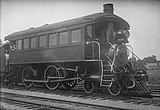Inspection locomotive

An inspection locomotive was a special type of steam locomotive designed to carry railroad officials on inspection tours of the railroad property.
Background
[edit]These were fitted with passenger car-like bodywork and seating. Many railroads in the nineteenth century owned one, but their use dwindled in the twentieth century. They were replaced with converted passenger-car inspection cars, or HiRail trucks, automobiles fitted with steel flanged wheels.
Some were especially built for this service, while others were rebuilt from obsolete locomotives. Many were quite small; the locomotive pictured is in fact one of the largest and most modern inspection locomotives ever constructed. They were generally well cared for and highly decorated.[1]
History by country
[edit]Brazil
[edit]In 1928, the Leopoldina Railway (de) purchased an inspection steam railcar by Sentinel Waggon Works.[2][3]
China
[edit]In 1907, the South Manchuria Railway in Manchuria (today northeastern China) bought two inspection locomotives built by Baldwin Locomotive Works.[4] An engine of the same class was delivered to Rochester & Pittsburg Coal & Iron Company in 1903.[5]
Peru
[edit]
The 3 ft narrow gauge Chimbote Railway (de) had an inspection locomotive built 1880 by Baldwin Locomotive Works.[6] The special feature was that it was equipped with a sleeping compartment.[2]
Russia
[edit]The Russian Railways still has two inspection locomotives A ChS2 540 & 549, which are converted electric locomotives of the ChS2 series.[7] Since 2018, A ChS2 549 has been in the museum at the Moskovsky Rail Terminal.
United Kingdom
[edit]
Railway companies in the United Kingdom rarely used inspection locomotives. Instead dedicated carriages (known as Inspection Saloons) were used. These were either rebuilt from obsolete coach stock or, occasionally, were newly built. However many companies maintained dedicated locomotives to haul Inspection Saloons. These were usually elderly engines that had been famous top-rank express locomotives when new but had since been surpassed. Examples of such engines include the Caledonian Railway Single, LNWR No.3020 'Cornwall' and NER No. 66 'Aerolite'.
Dugald Drummond, when Chief Mechanical Engineer of the London and South Western Railway had a small 4-2-4T tank locomotive classed F9 with a small saloon body mounted on its rear as his personal transport around the L&SWR system on inspections and visits.[8]
The Edinburgh and Glasgow Railway (E&GR) also had an inspection locomotive built in 1856. On 1 August 1865 the North British Railway absorbed the E&GR. The engine got the No. 312, in 1895 No. 879, in 1901 No. 1079. It was withdrawn 1911.[9]
In 1890, the London, Brighton and South Coast Railway built an inspection locomotive called Inspector. It was withdrawn in 1899.[10]
United States
[edit]By 1900, many railroads in the United States had inspection locomotives. A few examples:
-
Delaware, Lackawanna and Western Railroad (around 1900)
-
New York Central Railroad (around 1900)
-
Fitchburg Railroad (1897)
The only known surviving U.S. example is the Reading Railroad's "Black Diamond", a tiny 2-2-2 with fully enclosed bodywork, at the National Museum of Transportation in St. Louis, Missouri. It was used by the President of Philadelphia & Reading Coal and Iron Co. and other railroad executives on short business or inspection trips.[11]
References
[edit]- ^ "Inspektionslokomotive". Röll, Freiherr von: Enzyklopädie des Eisenbahnwesens (in German), Band 6. Berlin, Wien 1914, p. 270-271. Retrieved 19 May 2022.
- ^ a b Ostendorf, Rolf (1977). Dampftriebwagen, Bauarten, Typen und Systeme (in German). Motorbuchverlag, Stuttgart. pp. 180–181. ISBN 3-87943-517-0.
- ^ Locomotivas, carros e vagões (in Portuguese). Memória do Trem. 2008. p. 34. ISBN 9788586094095.
{{cite book}}:|work=ignored (help) - ^ "Locomotives for South Manchurian Railroads". The Railroad Gazette. XLIII (23). New York: 690. 1907-12-06. Retrieved May 24, 2022.
- ^ Ostendorf, Rolf (1977). Dampftriebwagen, Bauarten, Typen und Systeme (in German). Motorbuchverlag, Stuttgart. pp. 167–168. ISBN 3-87943-517-0.
- ^ "Chimbote Railway - Steam locomotive". Railroad Museum of Pennsylvania. Retrieved 19 May 2022.
- ^ "Легендарная "двойка" - качество, проверенное временем" (in Russian). Archived from the original on 2012-03-17. Retrieved 2022-05-21.
- ^ "Steam Locos of a Leisurely Era – LSWR Drummond's 'Bug'". 23 November 2010. Retrieved 19 May 2022.
- ^ "NBR Inspektionslokomotive" (in German). Retrieved 2022-05-25.
- ^ "Rare photographs of 481 'Inspector' (Ex 499 'Hayling Island')". Archived from the original on 30 June 2022. Retrieved 26 May 2022.
- ^ "World Class Collection - Rail". 19 May 2022.






